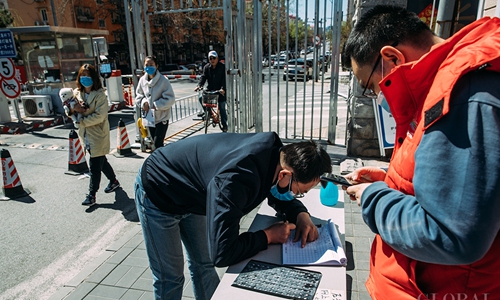HOME >> OPINION
Neighborhood committees are in the vanguard of virus control
By Wang Wenwen Source:Global Times Published: 2020/3/31 21:43:40

A man registers his information and health status at the gate of Laoshan Community before entry. Photo: Li Hao/GT
Returning to my residential community after some grocery shopping, I adjust my mask and roll up a sleeve to expose a bare wrist. "Temperature check, resident's pass please," the man manning the gate requests.For the past two months, this has been the new normal in Beijing. It's no big deal and it allows everyone to participate to some small degree in keeping the city and my neighborhood safe from the coronavirus. Everyone knows, if you're sick and have a temperature, don't go outside.
It is the job of the juweihui, or neighborhood committee, and other volunteers who are assigned shifts at the entrance gate. They're there 24/7 and brave February's deep freeze taking the temperatures over everyone who passes the gate.
They've been the gatekeepers of communities during the toughest days of China's fight against the virus, and are now an important line of defense as the country remains on high alert for a potential new wave of infection.
The neighborhood committee began as urban grassroots civil organizations in the 1950s. They are the lowest level of governance in charge of civil affairs.
For decades, the neighborhood committees were at the grassroots level of society, ensuring their communities were safe and well run. The committees' years of organizational experience enabled them to jump into action and release the country's great mobilization capability as soon as the threat of coronavirus became known.
The neighborhood committees are being credited with playing a key role in containing the spread of the virus in China, giving the country a distinct advantage in tackling dreadful situations at the grassroots. Here in Beijing, I received two calls from my neighborhood committee asking about my family's health and status in the early stage of the outbreak.
When Wuhan implemented lockdown measures, neighborhood committee workers knocked on resident's door to conduct regular temperature checks. They provided home delivery of daily food necessities to people in self-quarantine and elderly residents. Many residential buildings in Wuhan are old and don't have elevators, requiring committee staff to haul supplies up the stairs.
According to media reports, neighborhood committees in Jiangsu Province knocked on every door to make sure local residents had basic health and hygiene and gather information about people's health and travel history. They sometimes risk their own health as they leave groceries and other necessities outside the door of people under quarantine.
It is this grassroots-level governance that gives the Chinese people a sense of belonging and security, knowing there are people close by they can turn to if they need help. The timely, careful and dedicated work of members of neighborhood committees have without doubt helped quarantine sufficiently implemented and minimize people's movement, thus effectively contained the spread of the virus.
In the US and other Western countries, the lack of management at the lowest level of society has partly contributed to the increasing number of confirmed cases. In New York, where facts on the ground change almost by the hour, New Yorkers still don't know if it is safe to gather in large groups, what rules to follow if they isolate themselves, and where they turn to if they have symptoms, according to their media reports.
Some Western media claim China's grid management system and neighborhood committees are the state's presence in residential life and a measure of the Communist Party of China's control over people. This stereotyped view of China's grassroots governance is misinterpretation at best, and reflects their lack of willingness to adhere to their governments' anti-virus measures.
China's political mechanism, which doesn't indulge in partisan struggles, has the ability to vitalize even the smallest local community to contribute to the greater cause of the nation. Perhaps this is baffling for people in the West, but it could learn from China which knows that containing the spread of the virus must involve every neighborhood.
The author is an editor with the Global Times. wangwenwen@globaltimes.com.cn
Posted in: VIEWPOINT